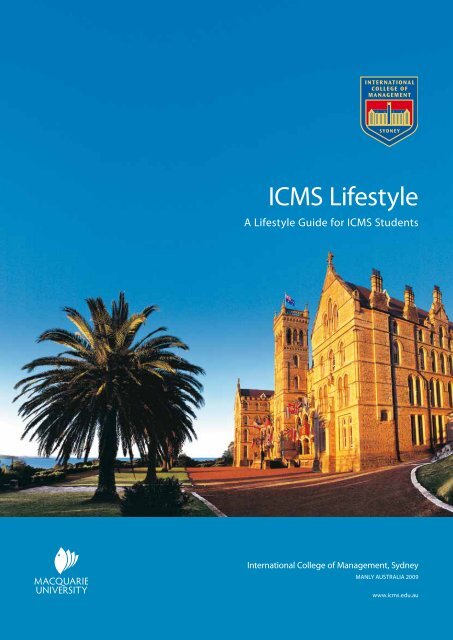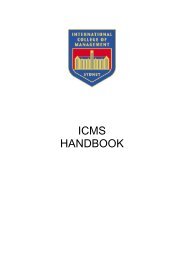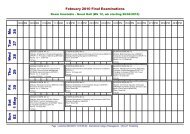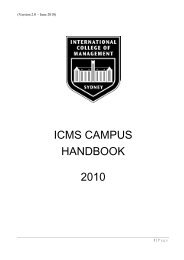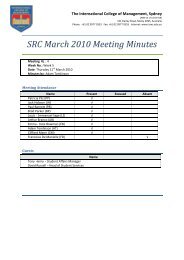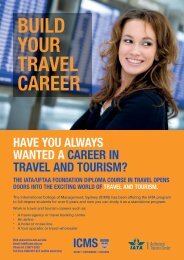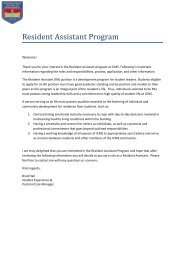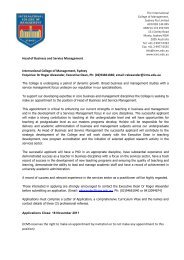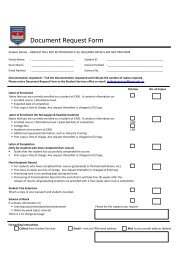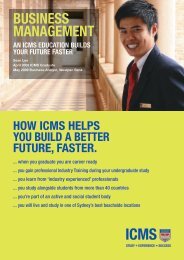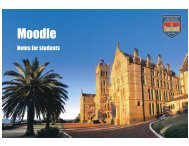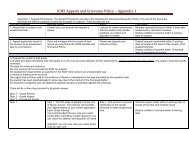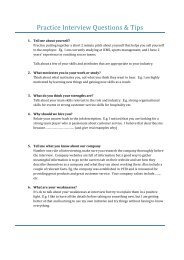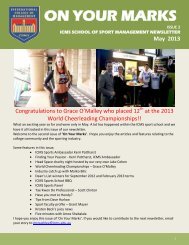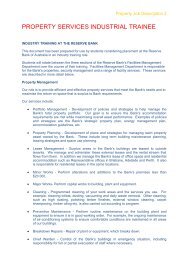ICMS lifestyle - ISO Germany
ICMS lifestyle - ISO Germany
ICMS lifestyle - ISO Germany
Create successful ePaper yourself
Turn your PDF publications into a flip-book with our unique Google optimized e-Paper software.
<strong>ICMS</strong> Lifestyle<br />
A Lifestyle Guide for <strong>ICMS</strong> Students<br />
International College of Management, Sydney<br />
Manly Australia 2009<br />
www.icms.edu.au
Introduction<br />
Dear Student,<br />
On behalf of all the faculty and staff at<br />
International College of Management, Sydney<br />
(<strong>ICMS</strong>) we congratulate you and we welcome you<br />
to our College as one of the family. This will surely<br />
be one of the most exciting and rewarding life<br />
experiences. The fact that you have what it takes<br />
to be part of your desired program from among<br />
many outstanding candidates attests to your<br />
academic achievements and your potential for<br />
leadership in the future.<br />
If you are coming from overseas, welcome to<br />
Australia and especially to our beautiful seaside<br />
suburb of Manly where no doubt you will take<br />
advantage of the cinemas, concert halls,<br />
restaurants, and of course the world-class surfing<br />
beach. You will soon discover a new culture living<br />
in this part of the world that we believe will<br />
enhance your overall experience with us.<br />
Best Regards,<br />
Frank Prestipino<br />
General Manager<br />
International College<br />
of Management, Sydney<br />
City of Sydney<br />
Manly Beach<br />
Manly is 15 minutes from the<br />
city of Sydney by fast ferry<br />
2
A priceless location<br />
<strong>ICMS</strong> is located in the beautiful beachside suburb of Manly,<br />
a cosmopolitan suburb of Sydney.<br />
Sydney is the largest city in Australia, with a population of over four million people<br />
from many cultural backgrounds.<br />
Sydney’s vibrant <strong>lifestyle</strong> includes restaurants, night clubs, cinemas, theatres,<br />
museums and art galleries. And within four hours drive you will find beaches, ski<br />
fields, farms and rainforests!<br />
Manly, about 15 minutes by fast ferry from the city, has much to offer - the beach,<br />
swimming, surfing and sailing and plenty of local night clubs, cafés and restaurants.<br />
And all only five minutes walk from <strong>ICMS</strong>!<br />
3
How to get to <strong>ICMS</strong><br />
From Sydney International Airport<br />
By taxi<br />
Taxis are available at the taxi rank outside Sydney International Airport.<br />
The taxi fare will cost approximately AU$55 and passengers pay for the<br />
Sydney Harbour Bridge toll (AU$2.50 - AU$4.00), any other road tolls as<br />
well as an airport toll of AU$2.50.<br />
By airport shuttle bus<br />
Collaroy Shuttle Bus, Northside Shuttle and Beachside Shuttle operate<br />
airport pickup services. The cost is approximately AU$30-40 and<br />
should be booked at least one week in advance. For more information<br />
please visit the <strong>ICMS</strong> website.<br />
By public transport<br />
The Sydney International Airport train station is located on the arrivals<br />
level of the terminal. Trains run approximately every 10 minutes and<br />
the journey to the city takes 15 minutes. The train fare costs<br />
approximately AU$14.80.<br />
Catch a train to Wynyard station in the city and then a bus to Manly.<br />
Alternatively, catch the train to Circular Quay and catch a ferry to Manly,<br />
which departs from wharf 3.<br />
You can find out more by visiting the Sydney Transport<br />
Infoline website:<br />
www.131500.com.au<br />
4
Life on campus<br />
Studying at <strong>ICMS</strong> gives you the opportunity<br />
to become a part of a vibrant and diverse<br />
college community.<br />
For all students, the opportunity to meet other<br />
people from around the world is one of the<br />
most memorable aspects of study at <strong>ICMS</strong>.<br />
With students from more than 40 countries, <strong>ICMS</strong><br />
offers a truly international experience.<br />
The College campus is housed in the historic St. Patrick’s Seminary,<br />
which has stood in its commanding position overlooking Manly and its<br />
surrounds since 1885. The beautiful sandstone building is surrounded<br />
by 20 hectares of parklands and has extensive campus facilities.<br />
It is only a short stroll down to one of the many beaches in Manly and<br />
Sydney Harbour where you can jump on a ferry that will take you<br />
directly to the city.<br />
<strong>ICMS</strong> is equipped with professional facilities, designed so that students<br />
can gain practical experience as part of their course.<br />
5
Facilities and services<br />
On campus accommodation<br />
Living on campus offers many benefits: meals are provided, rooms are<br />
furnished and you can enjoy convenient access to the College’s<br />
computer lab, library and sporting facilities.<br />
Rooms are located on separate male and female floors and consist of<br />
single, twin and triple share rooms. They are furnished with a bed,<br />
desk, heating and telephone. Students are provided with an individual<br />
code for personal phone calls. Linen (sheets and blankets), pillows and<br />
towels are provided as well.<br />
Each floor is equipped with common (share) bathrooms, a kitchenette<br />
containing a fridge, toaster, microwave oven, hot water boiler, sink and<br />
ironing equipment.<br />
Bed linen is laundered weekly by College housekeeping and for your<br />
personal laundry needs, a coin-operated laundry with washing<br />
machines and dryers is available.<br />
Meals are included with your accommodation fees. Breakfast, lunch<br />
and dinner are served in the Market Place café during the week, and<br />
brunch and dinner are provided on weekends.<br />
On campus accommodation is allocated on a first come, first<br />
served basis. Once you’ve decided to live on campus, make sure<br />
to complete your on campus accommodation request when you<br />
register for Orientation Week.<br />
Off campus accommodation<br />
Many accommodation options are available to students who don’t wish<br />
to live on campus. These include Homestay, shared houses or<br />
apartments and short term options.<br />
Homestay<br />
Students can experience life in a typical Australian family by choosing<br />
the Homestay option. Homestay usually includes board and meals.<br />
To find out more about Homestay opportunities contact<br />
OZ Homestay on 02 8765 9063 or:<br />
www.ozhomestay.com.au<br />
Share houses and apartments<br />
You may prefer to live with fellow students or local residents in a<br />
shared house or apartment close to the College. You will need to factor<br />
in the cost of living including rent, food, telephone and utilities such as<br />
electricity and gas.<br />
Apartments and houses are available through local real estate agents.<br />
Look in the real estate sections of local and national newspapers or<br />
online. The following are some suggestions to get you started:<br />
Websites<br />
www.realestate.com.au<br />
Newspapers<br />
The Sydney Morning Herald<br />
www.domain.com.au<br />
www.gumtree.com.au<br />
The Daily Telegraph<br />
The Manly Daily<br />
The College website posts advertisements for people searching<br />
for flatmates or local residents with rooms to rent.<br />
6
Short term accommodation<br />
You may not have decided where you want to live when you first arrive<br />
in Sydney. There are many short term options available close<br />
to the College while you’re deciding.<br />
The Our Manly website has listings for everything from backpacker<br />
hostels to serviced apartments.<br />
www.ourmanly.com.au<br />
Meals<br />
Students are not short on choice at <strong>ICMS</strong> – there are many options for<br />
you to enjoy meals both on and off campus.<br />
The Courtyard Café is open for all students from Monday to Friday.<br />
The Market Place is open for breakfast, lunch and dinner for residential<br />
students. Off campus students can purchase meal tickets (for dinner<br />
only) from reception to share a meal with your residential colleagues in<br />
the on campus servery.<br />
The Grand Dining Room is run by hospitality students and is open to<br />
the public for a three course lunch and dinner menu at a set price.<br />
Students are welcome to book into the dining room for a meal during<br />
term, and invite family and friends to join them.<br />
Manly provides a huge range of cafes and restaurants. Choose from<br />
Thai, Chinese, Japanese, Spanish, Italian, German, Indian, and modern<br />
Australian cuisine with dine in and takeaway options available. Many of<br />
the bars also have a dining area offering quick meals or special deals.<br />
Events on and off campus<br />
There are social events and activities for students almost daily, and<br />
along with community involvement and course activities you’ll have<br />
plenty to do.<br />
The College is surrounded by parkland and housed in extensive grounds<br />
that are perfect for relaxing in the sun, studying or reading.<br />
You can join in a game of tennis or basketball on the College court,<br />
bicycle along the beachfront, or access other sporting equipment free<br />
of charge such as surfboards and snorkelling gear.<br />
<strong>ICMS</strong> students also have access to New Image Gym located in Manly,<br />
where your student card provides access to the gym facilities at a<br />
discounted rate.<br />
Library<br />
The Pollard Resource Centre houses the College’s specialist library.<br />
Students have access to over 4,000 course specific publications and<br />
more than 100 professional journals. The Centre also has syndicate<br />
rooms designed for group study.<br />
7
What to bring<br />
Below is a list of items to bring from home to get you started at<br />
<strong>ICMS</strong>. Don’t worry if you forget some items – Sydney is a<br />
modern city where you will be able to purchase most if not all<br />
the items you would find in your home country, however, don’t<br />
forget to bring your passport, visa and your <strong>ICMS</strong> enrolment<br />
and payment documentation!<br />
Student Checklist<br />
General<br />
□ □ Passport for international students<br />
□ □ Enrolment documents and proof of payment for any payments<br />
made to <strong>ICMS</strong><br />
□ □ Toiletries including tooth brush, soap, shampoo<br />
□ □ Bathrobe<br />
□ □ Medication, extra contact lenses, glasses (if needed)<br />
□ □ Electrical adaptors for Australian electricity (240V)<br />
□ □ Umbrella<br />
□ □ Australian currency to pay for transport from the airport to<br />
<strong>ICMS</strong> and for your first few days in Australia<br />
Smart casual attire<br />
To save time and money during uniform fitting, you may wish to<br />
bring your own white button-up collared shirt and black closed<br />
toe leather shoes<br />
Males<br />
□ □ Black business socks<br />
□ □ Dress pants<br />
□ □ Collared, button up shirts – not polo shirts<br />
□ □ Polished black dress shoes with laces<br />
Females<br />
□ □ Dress pants and/or knee length skirts<br />
□ □ Collared button up shirts – not polo shirts<br />
□ □ Black or beige (neutral) stockings (pantyhose)<br />
□ □ Polished black closed toe, low heeled shoes – no stiletto heels<br />
General wear for male and female<br />
□ □ Sweaters and jacket/coat for the winter months<br />
□ □ Casual wear for sports and recreation, ie shorts, track suits and<br />
running shoes<br />
□ □ Swimwear, beach towel, a hat, sunscreen and sunglasses<br />
Many items can be purchased<br />
locally in Manly such as<br />
□ □ Coat hangers<br />
□ □ Laundry detergent<br />
□ □ Small radio and/or television for your room<br />
□ □ Personal items such as soap, tissues, deodorant<br />
□ □ Stationary and college supplies i.e. calculator, pens, binders,<br />
notebooks, dictionary (Australian English)<br />
8
Frequently asked questions<br />
Top 10 questions about life at <strong>ICMS</strong><br />
1. Can I have a single room? Single rooms are limited so room<br />
allocation is managed on a first come, first served basis. Special<br />
consideration is given for older students and those with special needs.<br />
2. When can I get my study timetable? Your timetable will be given to<br />
you by the Friday of Orientation Week. A brief overview of other<br />
Orientation Week activities and sessions can be found on page 11.<br />
3. Can I work while I study? International students are able to work while<br />
they study for up to 20 hours per week and full time during school<br />
breaks. You may have to apply separately for work permission after you<br />
have had your student visa issued depending on your country level of<br />
assessment. Please visit www.immi.gov.au/student for more<br />
information.<br />
4. What time is the earliest class? Classes can start as early as 8:00am<br />
and finish as late as 10:00pm. There are facilities on<br />
campus for students not living on campus to relax and study in<br />
between classes.<br />
5. What do I wear during Orientation Week? During Orientation Week<br />
students are expected to wear smart casual attire – see the checklist on<br />
page 8 for more detailed information.<br />
6. When will I be fitted for my uniform and when do I get it? During<br />
Orientation Week all students are fitted for their uniforms – this<br />
includes skirts, pants, jackets, shirts and ties. Your uniform will then be<br />
made and ready for delivery during week one of term. Uniforms<br />
requiring alteration may not arrive until week two. To save time and<br />
money student may bring their own closed-toe black leather shoes and<br />
white collared shirts. While your uniform is being made you are<br />
expected to wear business attire while in public areas on campus.<br />
7. What expenses does my deposit cover and are there any extra costs<br />
that I will need to pay for?<br />
International students: Your $3000 student deposit covers the cost of<br />
your uniform and the balance forms the basis of your student operating<br />
account, which all international students must keep at a minimum<br />
level of $500 ($1000 if living on campus). Students can charge a<br />
number of items to their operating account including activity fees<br />
and optional purchases such as a Macquarie Library card. These<br />
charges can change from term to term so please contact your agent or<br />
College representative to confirm the current charges.<br />
Domestic students: Domestic students have the option to either pay a<br />
$2000 deposit or pay for your uniform and other necessary items<br />
during Orientation Week by credit card.<br />
All students: Depending on the course you are studying, there may be<br />
additional costs, which will be charged to your student operating<br />
account or paid for by credit card.<br />
▪ ▪ Hospitality students: you will need a chef uniform and knife set<br />
which will be available for purchase during Orientation Week.<br />
▪ ▪ Event and Hospitality students: You will need to do the Responsible<br />
Service of Alcohol (RSA) course, which is an additional cost. More<br />
information will be provided during Orientation Week.<br />
Other expenses over the duration of your course which are normally<br />
charged to your student operating account include textbooks and<br />
overseas student health cover (OSHC) for years 2 and 3.<br />
8. Can I arrive before Orientation Week? Students living on campus<br />
can arrive prior to Orientation Week, depending on availability.<br />
Discounted accommodation rates are charged and no meals are<br />
provided during this time. The rates are AU$50 per night<br />
(1-3 nights) or AU$250 for 5-7 nights. Please include your early arrival date<br />
on the online Orientation Week registration form.<br />
9. What are the on campus rules? The campus rules are simple<br />
and designed to ensure professionalism and access to a well rounded<br />
education for all students and safety.<br />
The College business attire is to be worn to class and in public areas<br />
Monday to Friday between 8.00am and 5.30pm. Outside class hours<br />
casual wear is allowed.<br />
A professional conduct system is in place at <strong>ICMS</strong>. Students need to<br />
adhere to both grooming and behavioural standards and maintain a<br />
satisfactory point level in order to remain at the College.<br />
More information can be found in the Student Handbook<br />
which is available on the <strong>ICMS</strong> website.<br />
Students are encouraged to volunteer and participate in the<br />
Community Contribution Scheme, both in the College and the<br />
community. This could involve working at a College event such as Open<br />
Day or helping out at Bear Cottage, a local charity. A record of<br />
participation is listed on academic transcripts at the end of each term.<br />
To maintain student safety, no unauthorised visitors are allowed on<br />
College grounds. You must inform the College if you are expecting a<br />
visitor, and at no times are on campus students permitted to have<br />
outside visitors in their rooms.<br />
10. What about Internet access? <strong>ICMS</strong> has free wireless internet access<br />
available in common areas, classrooms and residential rooms. Students<br />
are welcome to bring their own laptops. There are three computer labs<br />
which are open 24 hours a day, 7 days a week to all students.<br />
9
Preparing for life at <strong>ICMS</strong><br />
What to do next<br />
Now that you’ve decided to study at <strong>ICMS</strong>, there are some important steps you have to do before<br />
you get on the plane or hop in the car!<br />
Step 1.<br />
Accepting your Letter of Offer<br />
International students: To accept your offer of a place at the College<br />
you need to pay your deposit and send your college representative<br />
your Confirmation of Enrolment request form as well as your signed<br />
acceptance declaration.<br />
Please make sure you have carefully read the terms and conditions<br />
relating to the <strong>ICMS</strong> refund policy prior to paying your deposit. This<br />
information will accompany your Letter of Offer. If you are not sure<br />
about the refund policy please contact your agent or college<br />
representative. In order to receive your Confirmation of Enrolment<br />
document (CoE), you need to have fulfilled any outstanding enrolment<br />
conditions as listed on your Letter of Offer.<br />
You will then be issued with a Letter of Acceptance and CoE confirming<br />
your place at <strong>ICMS</strong>.<br />
Domestic students: To accept your offer of a place you need to send the<br />
College your signed acceptance declaration.<br />
Step 2.<br />
Applying for your visa – International students<br />
Allow plenty of time for the visa process – it can take between 4 weeks<br />
and 3 months for a visa to be granted. Contact your nearest Australian<br />
Consulate or Embassy and complete the application form for an<br />
Australian student visa. You must attach your Letter of Offer from <strong>ICMS</strong><br />
to your visa application.<br />
Students who require a pre visa assessment (PVA) are generally those<br />
who fall into assessment level categories 3 and 4. DIAC will be able to<br />
provide you with information on whether you need a PVA. You will<br />
need to lodge an application on the basis of your Letter of Offer and be<br />
assessed as to whether you will be able to apply for a student visa.<br />
Please send your approval letter to <strong>ICMS</strong> once you have received it.<br />
Upon receiving your Confirmation of Enrolment from <strong>ICMS</strong>, submit this<br />
document to the Department of Immigration and Citizenship (DIAC) as<br />
part of your visa assessment.<br />
If you do not think you will receive your visa for commencement of<br />
term or if you are not granted a visa, please contact your agent or<br />
College representative.<br />
Visit the Department of Immigration and Citizenship website for<br />
more information.<br />
www.immi.gov.au<br />
Step 3.<br />
Book your on campus accommodation<br />
Accommodation is allocated on a first come, first served basis so<br />
students are advised to apply early. See more information about<br />
accommodation on page 6.<br />
An upfront refundable accommodation deposit of $500 is required to<br />
secure on campus accommodation. Students who have an operating<br />
account must maintain a minimum level of $1000 to cover the bond,<br />
and college-related items.<br />
Once accommodation has been confirmed full payment of residential<br />
fees will be required, prior to your arrival. Please refer to our refund<br />
policy for all terms and conditions before you pay your bond.<br />
Step 4.<br />
Payment of your tuition fees<br />
Next you are required to pay your tuition fees. This can be done by<br />
telegraphic transfer, cheque, direct deposit or cash. Please include your<br />
student ID located on your Letter of Offer on all payments so <strong>ICMS</strong> can<br />
allocate your payment correctly.<br />
Please send your College representative a copy of your payment<br />
confirmation along with your CoE request form and signed acceptance<br />
declaration. Don’t forget to bring your proof of payment to enrolment<br />
during Orientation Week!<br />
Step 5.<br />
Orientation Week and Enrolment<br />
Orientation Week is compulsory for all new students. It is a chance to<br />
settle in and become familiar with the campus, fellow students, and<br />
lecturers and gain an understanding of the workings and expectations<br />
of the College.<br />
In order to ensure your enrolment process is as smooth as possible,<br />
once you have received your Letter of Acceptance please register your<br />
details online by filling in the Orientation Week Registration Form.<br />
10
On campus students must check in on Saturday or Sunday prior<br />
to Orientation Week. If you intend to check in earlier please inform the<br />
College to confirm availability. There is an additional accommodation<br />
charge and please note that no meals will be available during this time.<br />
International off campus students need to arrive at the College on<br />
Monday of Orientation Week at 8:00am to begin official enrolment.<br />
During the day there will be compulsory enrolment sessions, campus<br />
tours, and business suit fittings. If you will be arriving later than<br />
Tuesday of Orientation Week you will need to inform your College<br />
representative.<br />
Domestic off campus students who have applied through<br />
UAC need to arrive at the College on Tuesday of Orientation<br />
Week at 8:00am.<br />
International students: For enrolment please make sure you bring your<br />
passport, copy of your CoE and proof of payment of fees.<br />
Domestic Students: For enrolment please make sure to bring your<br />
passport or birth certificate, tax file number and proof of any fees paid.<br />
Information sessions are held covering subjects such as working in<br />
Australia, computers on campus, professional conduct, library and<br />
study skills, and individual program information.<br />
A welcome cocktail reception is held on Tuesday evening of<br />
Orientation Week and students are encouraged to bring friends<br />
and family. Please RSVP when you complete the online Orientation Week<br />
Registration Form.<br />
11
Settling in to college life<br />
It’s a big deal starting college and at <strong>ICMS</strong>, students have help and<br />
support services available to make settling in to college life a smooth<br />
process.<br />
On campus students have access to Resident Assistants (RAs) - one for<br />
each floor of accommodation. RAs are fellow senior students who live<br />
on campus and provide a support service to residential students who<br />
have any concerns they wish to raise or are finding living on campus a<br />
bit overwhelming.<br />
A Graduate Assistant (GA) is on duty every night and they can be easily<br />
contacted via phone in an emergency.<br />
The Student Services department is there to help if you are experiencing<br />
any personal problems or have any concerns about College life. They can<br />
provide further guidance and appropriate help in most situations.<br />
Becoming involved in the College community is a great way to settle in.<br />
The Student Services Counter located on the ground floor in Kelly<br />
House, has plenty of information on activities not just at <strong>ICMS</strong>, but<br />
around Manly and Sydney in general.<br />
Term dates<br />
Term O Week Commences Start [Week One] End of Term [Last exam]<br />
May 2009 Monday, 25 May 2009 Monday, 1 June 2009 Thursday, 27 August 2009<br />
September 2009 Monday, 14 September 2009 Monday, 21 September 2009 Thursday, 17 December 2009<br />
February 2010 Monday February 1 Monday February 8 Thursday May 6<br />
May 2010 Monday May 24 Monday May 31 Thursday August 26<br />
September 2010 Monday September 13 Monday September 20 Thursday December 16<br />
Public holidays<br />
Holiday 2009 2010<br />
New Year’s Day Thursday, 1 January Friday, 1 January<br />
Australia Day Monday, 26 January Tuesday, 26 January<br />
Good Friday Friday, 10 April Friday, 2 April<br />
Easter Saturday Saturday, 11 April Saturday, 3 April<br />
Easter Monday Monday, 13 April Monday, 5 April<br />
Anzac Day Saturday, 25 April Monday, 26 April<br />
Queen’s Birthday Monday, 8 June Monday, 14 June<br />
Labour Day Monday, 5 October Monday, 4 October<br />
Christmas Day Friday, 25 December Saturday, 25 December<br />
Boxing Day Saturday, 26 December Monday, 27 December<br />
12
Support services<br />
Academic Support services<br />
The Academic Support Centre is open Monday to Friday between<br />
9am and 5pm. Staff are available to help you with study skills,<br />
preparing for exams and any other issues that may arise during<br />
your studies.<br />
The Academic Support Centre staff are there to help make the<br />
transition to studying and learning in a different culture and<br />
environment easier and overcome any concerns or difficulties that<br />
may arise. Some of the services they can help you with are:<br />
▪ ▪ Study techniques<br />
▪ ▪ Note taking skills<br />
▪ ▪ Exam preparation<br />
▪ ▪ Time and stress management<br />
▪ ▪ Academic writing<br />
▪ ▪ Oral presentations<br />
▪ ▪ English tuition<br />
Personal support<br />
If you feel overwhelmed at any time, or a personal problem arises,<br />
you can speak to our Student Services staff who can help you or<br />
guide you in finding appropriate help. To make an appoinment<br />
contact Student Services.<br />
Career Services<br />
Industry training is what makes a degree from <strong>ICMS</strong> different,<br />
and <strong>ICMS</strong> prides itself on giving its students the best possible<br />
industry training experience, which includes the industry training<br />
preparation program.<br />
This program includes presentations, resume building and mock<br />
interviews, resulting in career services staff finding a suitable job for<br />
students to work in and earn money. It doesn’t just stop there as<br />
the department has many industry links and is able to help students<br />
find a job upon graduation as well as organising companies to<br />
come to <strong>ICMS</strong> and give presentations for the purpose of recruiting<br />
<strong>ICMS</strong> students.<br />
13
A-Z guide to life in Australia<br />
Culture<br />
Australian people are generally very relaxed and laid back in manner and are known<br />
for their cheeky sense of humour and their ‘tell it how it is’ personality.<br />
Australians value common courtesies such as saying ‘please’ and ‘thank you’ and<br />
waiting patiently to be served or attended to. People will pay their own way, say<br />
what they think and enjoy both their personal space as well as group activities.<br />
Sydney is a multicultural city with many different nationalities residing here,<br />
creating a vibrant cosmopolitan culture. Australians are known for many things, but<br />
perhaps none more so than their passion and patriotism when it comes to sport,<br />
which makes up a large cultural part of life in Sydney.<br />
Food<br />
Sydney is a very cosmopolitan city overflowing with restaurants, cafes and bars able<br />
to cater to everyone’s taste and budget. As Sydney has such a diverse population<br />
this means there is a smorgasbord of food on offer such as Thai, Japanese, Indian,<br />
Greek, Italian, Vietnamese, Spanish and much more.<br />
Supermarkets and delicatessens are found in most suburbs and there is an<br />
abundance of fresh food markets selling everything from fresh fish and meat to<br />
Asian vegetables.<br />
Australians enjoy barbecues with steak, sausages, and seafood as typical<br />
ingredients. Many people enjoy fresh prawns on the beach with friends – a relaxing<br />
weekend experience during summer.<br />
Getting around<br />
<strong>ICMS</strong> is located 15 minutes by fast ferry from the city of Sydney. The public transport<br />
system in Sydney includes ferries, trains and buses.<br />
You can purchase individual or return tickets on the ferry at the ticket booths<br />
located on the wharf, or you may prefer to buy a ‘Ferry Ten’ which is valid for 10<br />
trips on the Manly ferry at a discounted price.<br />
On buses you can purchase a ticket on board and prices vary depending on how far<br />
you are travelling; while you do not need correct change, smaller notes and coins<br />
are appreciated. You can purchase a ‘Travel Ten’ ticket for buses from newsagents<br />
with are valid for 10 bus trips within certain zones. Don’t forget you will need to<br />
wave down the bus at a bus stop if you want it to stop!<br />
Trains operate fairly regularly in the city and tickets are purchased from booths or<br />
machines at railway stations. The closest railway station to Manly is at North Sydney,<br />
accessible by bus.<br />
If you intend to do a lot of travelling, it can be worthwhile purchasing a<br />
weekly ticket which covers unlimited travelling on combined forms of transport<br />
around Sydney.<br />
Getting out of Sydney<br />
There are many day trips that are only a short distance from Sydney. Travel by car,<br />
bus or train to the Blue Mountains two hours west of Sydney for spectacular<br />
scenery, rock climbing and bushwalks; one and a half hours south of Sydney is<br />
Wollongong and the south coast for spectacular surfing beaches; a visit to the<br />
Hunter Valley renowned for its wineries is only three hours away, and the Central<br />
Coast with more sun and surf is only one hour away.<br />
Other nearby destinations ideal for a weekend away include Canberra, the capital of<br />
Australia and famous for its Floriade flower festival in the Spring or the Snowy<br />
Mountains, perfect for skiing or snowboarding in the Winter months. The central<br />
location of Sydney on the East Coast means other Australian cities such as<br />
Melbourne and Brisbane are only a short plane ride away.<br />
14
Health insurance<br />
International students are required to have specific student medical insurance<br />
during their stay in Australia. <strong>ICMS</strong> will arrange the first year of Overseas Student<br />
Health Cover (OSHC), which is deducted from your student operating account.<br />
Students need to arrange their own health cover after their first year.<br />
OSHC assists towards covering the costs of fees for doctors, specialists, ambulance<br />
transport, prescription medicines and emergency medical services, should the<br />
need arise.<br />
Norwegian and Swedish students do not need OSHC as cover is provided by a<br />
national health scheme, but you will need to provide evidence of either the<br />
‘Norwegian National Insurance Scheme’ or ‘Swedish National Board of Student Aid’<br />
during Orientation Week.<br />
History<br />
Australia was inhabited by native Aboriginal tribes for thousands of years prior to<br />
British settlement. The Australian Aboriginal people have a strong bond to the land<br />
and express these spiritual links through stories, art and dance. You will notice<br />
many suburbs and towns have Aboriginal names and many rock art sights still<br />
remain for you to visit, including the peninsula on which <strong>ICMS</strong> is located.<br />
Captain James Cook sailed the Endeavour from England and landed in Australia in<br />
1770. Eighteen years later in 1788, Sydney became the first place in Australia to be<br />
colonised by the British when convicts arrived on the First Fleet, led by Captain<br />
Arthur Phillip. Many of the older sandstone buildings built by convicts during this<br />
time remain, particularly around the Rocks area of Sydney.<br />
Sydney has undergone expansion, growth and prosperity over the last century<br />
characterised by a history of immigration and hard working migrants. The Gold<br />
Rush of the mid 19th century saw a large influx of foreign miners immigrate to<br />
Australia which dramatically increased the population.<br />
The Commonwealth of Australia was proclaimed in 1901 and Edmund Barton<br />
became the first Prime Minister of Australia. Industrialisation of Sydney soon<br />
followed which saw both the city and population expand rapidly, with waves of<br />
European arriving following World War II. From the early 1970s onwards, Australia<br />
has welcomed immigrants from all parts of Asia, the Middle East, Africa, and the<br />
Americas.<br />
Today Sydney is a vibrant cosmopolitan city comprised of a diverse range of<br />
nationalities that celebrates and prides itself on its multiculturism. Sydney has<br />
become known as a world class city through successful events such as the 2000<br />
Olympic Games, the Rugby World Cup 2003 and APEC 2007.<br />
Location<br />
Australia is the sixth largest country in the world in terms of land mass. Sydney is<br />
the capital of the state of New South Wales (NSW) and is located on the east coast of<br />
Australia. Over 4 million people live in Sydney, a beautiful harbour city surrounded<br />
by national parks, iconic beaches and world heritage sights.<br />
The size and distance between cities in Australia can sometimes catch travellers by<br />
surprise. Sydney serves as a hub for many international flights, and although it is<br />
only a short plane ride away from other state capitals Brisbane (Queensland) and<br />
Melbourne (Victoria), it is at least 12 hours to these destinations by car! It is<br />
approximately three hours by road from Canberra, the capital of Australia. And<br />
Perth on the west coast is a five hour plane trip.<br />
15
A-Z guide to life in Australia<br />
Money and the cost of living<br />
The Australian Dollar is the unit of currency with 100 cents making up AU$1. Coins<br />
come in denominations of $2, $1, 50c, 20c, 10c and 5c, and notes, differentiated by<br />
colour, come in $100, $50, $20, $10 and $5.<br />
When shopping, your total expenditure is rounded to the nearest 5 cents.<br />
International credit cards such as Visa, American Express, MasterCard and Diners<br />
Club are accepted widely throughout Australia.<br />
Automatic Teller Machines (ATMs) are located throughout Australia and there is<br />
even one on the <strong>ICMS</strong> campus. Banks are open Monday to Thursday between<br />
9:30am to 4pm and on Friday between 9:30am and 5pm.<br />
Australia has a 10% Goods and Services Tax (GST) which is automatically added to<br />
purchases; it is usually included in the advertised price at all retail outlets.<br />
In Australia you are not expected to tip however if you would like to tip waiters or<br />
taxi drivers 10% of the bill is sufficient. Most museums and attractions offer student<br />
discounts so if you have your student identification card, you can benefit from a<br />
range of concessions.<br />
The cost of living in Sydney compares with many European and Asian cities. You can<br />
determine your budget depending on the type of <strong>lifestyle</strong> you wish to lead.<br />
Fortunately, Sydney is an outdoor city so many activities can be undertaken free of<br />
charge or for minimal expense.<br />
All costs are in Australian Dollars (AU$) and are estimates only. International<br />
students require a minimum of AU$14,000 to AU$18,000 per year for living expenses<br />
(not including tuition).<br />
Accommodation<br />
▪▪<br />
On campus starting at $3,850 per term including meals<br />
▪▪<br />
One bedroom apartment $300-$400 per week<br />
▪▪<br />
Bedroom in a two or three room apartment $150-300 per week<br />
Utilities<br />
All utilities are billed monthly and will be dependent on usage<br />
▪▪<br />
Gas initial connection from $150 + $5-$8 per week<br />
▪▪<br />
Electricity initial connection from $150 + $5-$8 per week<br />
▪▪<br />
Telephone initial connection from $59 + about $5 per week<br />
▪▪<br />
Mobile phone about $10-$25 per week<br />
▪▪<br />
Internet about $5-$20 per week<br />
Entertainment<br />
▪▪<br />
Movie ticket $12-$16<br />
▪▪<br />
Restaurants $15 + per meal<br />
▪▪<br />
Take away meals $10-$20 per meal<br />
▪▪<br />
Lunch on campus $8-$12 per meal<br />
▪▪<br />
Cup of coffee $2.50 +<br />
Politics and government<br />
Australia is a constitutional monarchy comprising three levels of government:<br />
Federal, State and local. The Prime Minister is the head of government. Two main<br />
political parties dominate Federal and State government, the Australian Labor Party<br />
and the coalition between the Liberal and National parties. Australia is part of the<br />
Commonwealth, and the Queen of England remains head of state.<br />
Australia’s political stability and low crime rate supported by strict anti-gun and<br />
drug laws make it a safe and peaceful society.<br />
16
Religion<br />
Australia is a secular state with no official religion. As a result there is widespread<br />
tolerance and acceptance of different cultures and religious beliefs. Sydney has<br />
churches that represent almost all Christian denominations, as well as synagogues,<br />
mosques, Hindu and Buddhist temples.<br />
Safety<br />
Sydney is not a dangerous city, but like all big cities you should take necessary<br />
precautions to ensure your safety. This includes keeping an eye on your belongings,<br />
locking your apartment door when you leave and avoiding parks and alley ways late<br />
at night. When travelling on public transport late at night try and sit in a<br />
compartment with other travellers and travel in pairs if at all possible.<br />
Manly is located in a safe community and there tend to be people out and about<br />
after dark. The campus of <strong>ICMS</strong> has round the clock security and a Graduate<br />
Assistant is available 24 hours a day for any problems that should arise.<br />
Time<br />
Sydney follows Eastern Standard Time (EST), 10 hours ahead of Coordinated<br />
Universal Time (UTC) and Greenwich Mean Time (GMT). From late October to March,<br />
‘daylight saving’ moves Sydney one hour ahead of standard time, giving<br />
Sydneysiders an extra hour of daylight to enjoy over the summer months.<br />
Visa requirements<br />
All international students are required to have an Australian student visa upon<br />
enrolment to the College.<br />
For more information on visa processing and guidelines please visit:<br />
www.studyinaustralia.gov.au<br />
Weather<br />
Sydney enjoys a temperate climate that means it is pleasant most of the year.<br />
Winters are fairly mild (compared to most climates) lasting from June to<br />
August and the summer months of December to February are hot and humid.<br />
Remember that the seasons in the southern hemisphere are the opposite to the<br />
northern hemisphere.<br />
What to wear<br />
Australians tend to dress casually in most situations. During the day people will<br />
wear jeans, pants, skirts or shorts. In the cooler months you will need a jumper and<br />
jacket. At night people may dress more formally with collared shirts and dresses<br />
depending on where they are going. At <strong>ICMS</strong> you are required to wear your<br />
business suit to class and in public areas however when you do not have classes you<br />
are able to wear casual clothes in non public areas.<br />
Temperatures in Sydney<br />
[Source: Australian Bureau of Meteorology]<br />
30<br />
25<br />
20<br />
15<br />
10<br />
5<br />
0ºc<br />
Jan Feb Mar Apr May Jun Jul Aug Sep Oct Nov Dec<br />
Mean daily max. temperature<br />
[degrees celsius]<br />
Seasons<br />
Summer<br />
Autumn<br />
Winter<br />
Spring<br />
Mean daily min. temperature<br />
[degrees celsius]<br />
December – February<br />
March – May<br />
June – August<br />
September – November<br />
Working in Sydney<br />
As an international student in Australia, you are able to work in paid employment<br />
up to 20 hours per week, and unlimited hours during university vacation periods.<br />
For more information visit:<br />
www.immi.gov.au/students<br />
Some helpful job search websites:<br />
www.seek.com.au<br />
www.mycareer.com.au<br />
17
Calendar of events<br />
Sydney is busy and vibrant – there is always something to see and do.<br />
Best of all many events, activities and concerts are free.<br />
Go to www.seesydney.com.au for further information.<br />
January<br />
▪▪<br />
▪▪<br />
▪▪<br />
▪▪<br />
Cricket is in full swing – catch a game<br />
Join in Australia’s national day<br />
celebrations on 26 January<br />
Sydney Festival showcasing art, theatre,<br />
music and dance<br />
Big Day Out showcasing local and<br />
international bands<br />
April<br />
▪▪<br />
▪▪<br />
▪▪<br />
▪▪<br />
Explore Australian art at the Archibald,<br />
Wynne and Sulman Prize exhibition<br />
AJC Autumn Racing Carnival<br />
Sydney’s Garden Show<br />
ANZAC day parade<br />
July<br />
▪▪<br />
▪▪<br />
▪▪<br />
▪▪<br />
Enjoy “Christmas in July” in the Blue<br />
Mountains, two hours west of Sydney<br />
State of Origin Rugby League Final<br />
Wallabies take on France and<br />
New Zealand in rugby<br />
Aroma Coffee Festival at the Rocks<br />
February<br />
▪▪<br />
▪▪<br />
▪▪<br />
▪▪<br />
Sydney’s Chinatown comes alive for<br />
Chinese New Year celebrations<br />
Take a dip in the harbour for the annual<br />
Sydney Harbour Swim Classic<br />
Super 14 Rugby Kicks off<br />
Shakespeare by the Sea<br />
May<br />
▪▪<br />
▪▪<br />
▪▪<br />
Climb the Sydney Harbour Bridge – walk<br />
for free up a pylon or join a BridgeClimb<br />
tour and walk to the top of the arch<br />
Sydney Writers’ Festival<br />
Australian Fashion Week<br />
August<br />
▪▪<br />
▪▪<br />
Join 60,000 runners in Sydney’s biggest<br />
fun run, the City to Surf<br />
Sydney International Boat Show<br />
March<br />
▪▪<br />
▪▪<br />
▪▪<br />
▪▪<br />
Sydney’s biggest party – dance the night<br />
away at Mardi Gras, the culmination of a<br />
month long festival<br />
Rowing championships and Kings Cup<br />
Regatta, Penrith<br />
National Rugby League kicks off<br />
Sydney Royal Easter Show<br />
June<br />
▪▪<br />
▪▪<br />
▪▪<br />
▪▪<br />
▪▪<br />
The Sydney Film Festival showcases the<br />
best films from Australia and the world<br />
Manly Food and Wine Festival<br />
Darling Harbour Jazz Festival<br />
Manly Beach soft sand classic<br />
Biennale of Sydney – international festival<br />
of contempary art<br />
September<br />
▪▪<br />
▪▪<br />
▪▪<br />
Festival of the Winds<br />
Manly Jazz Festival<br />
Manly Arts Festival<br />
October<br />
▪▪<br />
▪▪<br />
▪▪<br />
▪▪<br />
Sculpture by the Sea is Australia’s largest<br />
outdoor sculpture exhibition, set on the<br />
spectacular cliffs of Bondi<br />
Good Food Month<br />
National Rugby League Grand Final<br />
Sydney Motor Show<br />
November<br />
▪▪<br />
▪▪<br />
▪▪<br />
▪▪<br />
Dance flamenco at the Spanish Quarter<br />
Street Festival<br />
Festival of the Olive – a Mediterranean<br />
Feast, Rosehill<br />
Bridge to Bridge Water Ski Classic,<br />
Windsor<br />
Avalon market day<br />
December<br />
▪▪<br />
▪▪<br />
▪▪<br />
Christmas Carols in the Domain – a free<br />
event attended by tens of thousands of<br />
Sydneysiders<br />
Enjoy New Years Eve celebrations by the<br />
harbour with firework displays and street<br />
parties<br />
Sydney to Hobart yacht race<br />
18
A U S T R A L I A<br />
Sydney<br />
TO NORTHERN<br />
BEACHES<br />
MANLY<br />
Shopping Mall<br />
and Restaurants<br />
Manly<br />
Beach<br />
INTERNATIONAL<br />
COLLEGE OF<br />
MANAGEMENT,<br />
SYDNEY<br />
Manly Wharf<br />
Manly<br />
Hospital<br />
Sydney Harbour<br />
National Park<br />
Scenic Lookout<br />
TO MACQUARIE<br />
UNIVERSITY<br />
Sydney<br />
Harbour<br />
Bridge<br />
The Rocks<br />
Circular Quay<br />
Darling Harbour<br />
SYDNEY<br />
P O RT<br />
Taronga<br />
Zoological<br />
Gardens<br />
Sydney Opera House<br />
Botanical Gardens<br />
Australian Art Gallery<br />
Centrepoint Tower<br />
Manly fast ferry –15 mins<br />
J A C K S O N<br />
S O U T H<br />
PA C I F I C<br />
O C E A N<br />
Exhibition Centre<br />
Sydney Entertainment Centre<br />
TO SYDNEY<br />
AIRPORT<br />
Sydney Cricket<br />
Ground<br />
BONDI<br />
Bondi<br />
Beach<br />
19
International College of Management, Sydney 151 Darley Road, Manly, Sydney NSW 2095 Australia<br />
Phone: 612 9977 0333 Fax: 612 9977 8667 Toll free: 1800 657 572 [within Australia] Email: info@icms.edu.au<br />
Disclaimer: Every effort has been made to ensure the accuracy of information given in the brochure. The College reserves the right to change the contents without prior notice. Information in this publication is correct at time of printing, but<br />
is subject to change from time to time. In particular, the College reserves the right to change the content or the method of presentation of any unit of study, or to withdraw any unit or program of study which it offers, or to impose limitations<br />
on enrolment in any unit or program of study. College fees are subject to change. ABN 54 174 259 919<br />
CRICOS: 0148M, 00002J. Published May 2009. Designed by Wolff www.wolffdesign.com.au WGD4534


